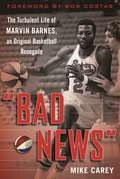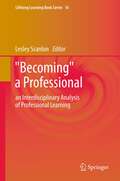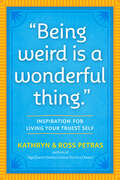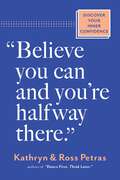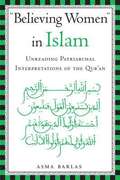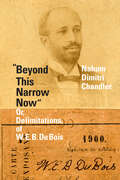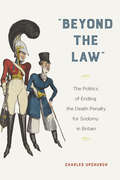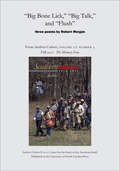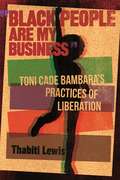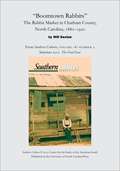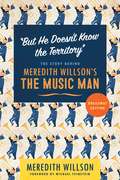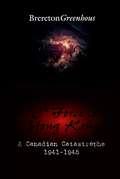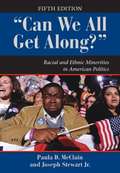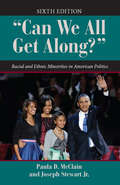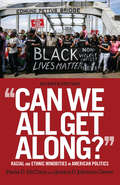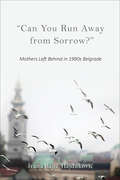- Table View
- List View
"Bad News": The Turbulent Life of Marvin Barnes, Pro Basketball's Original Renegade
by Mike Carey Bob CostasMarvin "Bad News" Barnes was considered a future Hall of Fame basketball player before he even graduated from college. A standout at Providence College, where he averaged 20.7 points and 17.9 rebounds per game, he was an All-American with the world at his fingertips.Although Barnes enjoyed two highly successful years in the American Basketball Association with the Spirits of St. Louis (winning Rookie of the Year honors and twice being named an All-Star), his career fizzled in the NBA as he wore out his welcome with the Detroit Pistons, Buffalo Braves, Boston Celtics, and San Diego Clippers in four years. His immaturity, as well as a chronic losing battle with drugs and alcohol, turned a potential superstar into a has-been by 1979. By then, his swagger was gone. So too was his game.Written by Mike Carey, who opened his house to Barnes later in his life, this is the story of a supremely gifted athlete whose self-destructive nature led to him living on the mean streets of East San Diego for three years as a panhandler and pimp. Eventually he would serve a total of five years in prison for various felony charges, including the sale of cocaine.Throughout his life, every time it appeared that "Bad News" had turned the corner, his demons reappeared and succeeded in luring him back into becoming a conniving dope fiend.On September 8, 2014, Barnes finally hit rock bottom, passing away due to acute cocaine and heroin intoxication. He was sixty-two years old.With stories and quotes from Julius Erving, Bill Walton, Larry Brown, Mike D'Antoni, and many others who crossed paths with Barnes, as well as a foreword from former Spirits announcer Bob Costas, "Bad News" is the story of a squandered talent who could never defeat his inner demons.
"Be the Change You Wish to See in the World": Choosing to Be a Resonant Leader
by Annie Mckee Richard BoyatzisBecoming a great and resonant leader does not happen by accident. This chapter asks leaders to tackle the challenges of personal transformation and renewal to achieve resonance.
"Becoming" a Professional: an Interdisciplinary Analysis of Professional Learning (Lifelong Learning Book Series #16)
by Lesley ScanlonThis book is founded on the idea that 'becoming' is the most useful defining concept for a new 'professional' class whose members understand that development in their working lives is an open-ended, lifelong process of refinement and learning. In a world where being a 'professional' is an increasingly indistinct notion and where better education and technology are challenging 'professional' norms, it is imperative that we no longer think in terms of an exclusive, 'Anglo-American', knowledge-rich class of workers. Exploring the implications of this insight for professions including nursing, teaching, social work, engineering and the clergy, this volume aims to encourage informed debate on what it means to be a 'professional' in this globalised 21st century. The book argues that 'becoming' a professional is a lifelong process in which individual professional identities are constructed through formal education, workplace interactions and popular culture. The book advocates the 'ongoingness' of developing a professional self throughout one's professional life. What emerges is a concept of becoming a professional different from the isolated, rugged, individualistic approach to traditional professional practice as represented in popular culture. It is a book for the reflective professional.
"Being Weird Is a Wonderful Thing": Inspiration for Living Your Truest Self
by Ross Petras Kathryn PetrasA gift that celebrates being yourself, in your own unique way. Do you ever feel different? A little weird, a little wacky? It&’s time to own it, because, as Meryl Streep proclaimed, &“what makes you different or weird, that&’s your strength.&” In this inspiring collection, singers, poets, actors, activists, comedians, designers, athletes, and philosophers share wise and pithy reflections on what it&’s like to march to the beat of a different drummer. Every statement is a powerful, positive reminder that to live successfully is to be completely unapologetically you. &“We are not what other people say we are. We are who we know ourselves to be, and we are what we love. That&’s OK.&” —Laverne Cox &“All the colors I am inside have not been invented yet.&” —Shel Silverstein &“I am different, not less&” —Temple Grandin &“The more I feel imperfect, the more I feel alive.&” —Jhumpa Lahiri &“Self-censorship is insulting to the self. Timidity is a hopeless way forward.&” —Ai Weiwei
"Believe You Can and You're Halfway There": Discover Your Inner Confidence
by Ross Petras Kathryn PetrasA compilation of musings to motivate and inspire readers in need of a quick pick-me-up. We all want to be the person who marches into a meeting brimming with self-confidence, unbothered by what others think of them right before making a killer speech. But all too often, crippling self-doubt creeps in. This book is a self-esteem boosting collection of pocket-sized pep talks from successful people in a multitude of fields, including Serena Williams, Stephen King, Helen Keller, Julia Child, and so much more—that will give readers a strong dose of self-assurance. &“I am lucky that whatever fear I have inside me, my desire to win is always stronger.&” —Serena Williams &“The scariest moment is always just before you start.&” —Stephen King &“Optimism is the faith that leads to achievement. Nothing can be done without hope and confidence.&” —Helen Keller &“Just speak very loudly and quickly, and state your position with utter conviction, as the French do, and you&’ll have a marvelous time!&” —Julia Child
"Believing Women" in Islam
by Asma BarlasDoes Islam call for the oppression of women? Non-Muslims point to the subjugation of women that occurs in many Muslim countries, especially those that claim to be "Islamic," while many Muslims read the Qur'an in ways that seem to justify sexual oppression, inequality, and patriarchy. Taking a wholly different view, Asma Barlas develops a believer's reading of the Qur'an that demonstrates the radically egalitarian and anti-patriarchal nature of its teachings. Beginning with a historical analysis of religious authority and knowledge, Barlas shows how Muslims came to read inequality and patriarchy into the Qur'an to justify existing religious and social structures and demonstrates that the patriarchal meanings ascribed to the Qur'an are a function of who has read it, how, and in what contexts. She goes on to reread the Qur'an's position on a variety of issues in order to argue that its teachings do not support patriarchy. To the contrary, Barlas convincingly asserts that the Qur'an affirms the complete equality of the sexes, thereby offering an opportunity to theorise radical sexual equality from within the framework of its teachings.
"Beneficial" Delays in Debt Restructuring Negotiations
by Ran BiA report from the International Monetary Fund.
"Beyond This Narrow Now": Or, Delimitations, of W. E. B. Du Bois
by Nahum Dimitri ChandlerIn “Beyond This Narrow Now” Nahum Dimitri Chandler shows that the premises of W. E. B. Du Bois's thinking at the turn of the twentieth century stand as fundamental references for the whole itinerary of his thought. Opening with a distinct approach to the legacy of Du Bois, Chandler proceeds through a series of close readings of Du Bois's early essays, previously unpublished or seldom studied, with discrete annotations of The Souls of Black Folk: Essays and Sketches of 1903, elucidating and elaborating basic epistemological terms of his thought. With theoretical attention to how the African American stands as an example of possibility for Du Bois and renders problematic traditional ontological thought, Chandler also proposes that Du Bois's most well-known phrase—“the problem of the color line”—sustains more conceptual depth than has yet been understood, with pertinence for our accounts of modern systems of enslavement and imperial colonialism and the incipient moments of modern capitalization. Chandler's work exemplifies a more profound engagement with Du Bois, demonstrating that he must be re-read, appreciated, and studied anew as a philosophical writer and thinker contemporary to our time.
"Beyond the Law": The Politics of Ending the Death Penalty for Sodomy in Britain (Sexuality Studies)
by Charles UpchurchIn nineteenth-century England, sodomy was punishable by death; even an accusation could damage a man’s reputation for life. The last executions for this private, consensual act were in 1835, but the effort to change the law that allowed for those executions was intense and precarious, and not successful until 1861. In this groundbreaking book, “Beyond the Law,” noted historian Charles Upchurch pieces together fragments from history and uses a queer history methodology to recount the untold story of the political process through which the law allowing for the death penalty for sodomy was almost ended in 1841. Upchurch recounts the legal and political efforts of reformers like Jeremy Bentham and Lord John Russell—the latter of whom argued that the death penalty for sodomy was “beyond the law and above the law.” He also reveals that a same-sex relationship linked the families of the two men responsible for co-sponsoring the key legislation. By recovering the various ethical, religious, and humanitarian arguments against punishing sodomy, “Beyond the Law” overturns longstanding assumptions of nineteenth-century British history. Upchurch demonstrates that social change came from an amalgam of reformist momentum, family affection, elitist politics, class privilege, enlightenment philosophy, and personal desires.
"Big Bang" Versus Gradualism in Economic Reforms: An Intertemporal Analysis with an Application to China
by Saleh M. Nsouli Andrew FeltensteinA report from the International Monetary Fund.
"Big Bone Lick," "Big Talk," and "Flush": three poems (Southern Cultures #Volume 17 Number 3)
by Robert MorganMason-Dixon Lines "Big Bone Lick," "Big Talk," and "Flush" poetry by Robert MorganRobert Morgan drives home a similar message with three poems. They address "memory" on the grandest scale-- not merely familial or communal but epochal and even geologic." . . . for ten millennia, the bonesseemed wreckage from a mighty dream . . . "
"Black People Are My Business": Toni Cade Bambara's Practices of Liberation (African American Life Series)
by Thabiti Lewis"Black People Are My Business": Toni Cade Bambara’s Practices of Liberation studies the works of Bambara (1939–1995), an author, documentary filmmaker, social activist, and professor. Thabiti Lewis’s analysis serves as a cultural biography, examining the liberation impulses in Bambara’s writing, which is concerned with practices that advance the material value of the African American experience and exploring the introspection between artist production and social justice. This is the first monograph that focuses on Bambara’s unique approach and important literary contribution to 1970s and 1980s African American literature. It explores her unique nationalist, feminist, Marxist, and spiritualist ethos, which cleared space for many innovations found in black women’s fiction. Divided into five chapters, Lewis’s study relies on Bambara’s voice (from interviews and essays) to craft a "spiritual wholeness aesthetic"—a set of principles that comes out of her practices of liberation and entail family, faith, feeling, and freedom—that reveals her ability to interweave ethnic identity, politics, and community engagement and responsibility with the impetus of balancing black male and female identity influences and interactions within and outside the community. One key feature of Bambara’s work is the concentration on women as cultural workers whereby her notion of spiritual wholeness upends what has become a scholarly distinction between feminism and black nationalism. Bambara’s fiction situates her as a pivotal voice within the Black Arts Movement and contemporary African American literature. Bambara is an understudied and important artistic voice whose aversion to playing it safe both personified and challenged the boundaries of black nationalism and feminism. "Black People Are My Business" is a wonderful addition to any reader’s list, especially those interested in African American literary and cultural studies.
"Boomtown Rabbits": The Rabbit Market in Chatham County, North Carolina, 1880-1920 (Southern Cultures #Volume 18 Number 2)
by Will SextonAlthough the same cottontails flourished across the region, Chatham County turned its rabbits into something like a regional brand, recognized throughout the South and along the eastern seaboard. By the end of the nineteenth century, Siler City had become the de facto rabbit capital of the southeast." This article appears in the Summer 2012 issue of Southern Cultures. The full issue is also available as an ebook. Southern Cultures is published quarterly (spring, summer, fall, winter) by the University of North Carolina Press. The journal is sponsored by the University of North Carolina at Chapel Hill's Center for the Study of the American South.
"But He Doesn't Know the Territory": The Story behind Meredith Willson's The Music Man
by Meredith WillsonChronicles the creation of Meredith Willson&’s The Music Man—reprinted now as the Broadway Edition Composer Meredith Willson described The Music Man as &“an Iowan&’s attempt to pay tribute to his home state.&” Now featuring a new foreword by noted singer and educator Michael Feinstein, this book presents Willson&’s reflections on the ups and downs, surprises and disappointments, and finally successes of making one of America&’s most popular musicals. Willson&’s whimsical, personable writing style brings readers back in time with him to the 1950s to experience firsthand the exciting trials and tribulations of creating a Broadway masterpiece. Fresh admiration of the musical—and the man behind the music—is sure to result.
"C" Force to Hong Kong: A Canadian Catastrophe
by Brereton GreenhousThis is the story of a “no military risk” campaign that slowly turned into a nightmare. The book provides new answers to a number of difficult questions beginning with a discussion of why Canadian troops were sent to Hong Kong at the request of the British War Office. Were the British duplicitous in making this request? Was Canadian Chief of the General Staff, Lieutenant-General Harry Crerar, guilty of putting his own interests above those of his men in telling the minister of National Defence that there was “no military risk” in sending the “C” Force? The book recounts the formation of the “C” Force and its departure to Hong Kong where it arrived just three weeks before the Japanese attack. It outlines the course of the battle from December 8, 1941, until the inevitable surrender of the garrison on Christmas Day. It places appropriate emphasis on the Canadian contribution, refuting 1947 allegations by the British General-Officer-Commanding — allegations which were only made public in 1993 — that the Canadians did not fight well. Greenhous attacks these charges with solid evidence from participants and eye-witnesses. Finally, the book tells the story of life and death in the prison camps of Hong Kong and Japan.
"Can We All Get Along?"
by Paula D. Mcclain Joseph Stewart Jr.In a nation built by immigrants and bedeviled by the history and legacy of slavery and discrimination, issues of liberty, equality, and community continue to challenge Americans. In the fifth edition of this widely acclaimed text, Paula McClain and Joseph Stewart combine traditional elements of political science analysis--history, Constitutional theory, institutions, political behavior, and policy actors--with a fully updated survey of the political status of four major groups: blacks, Latinos, Asian Americans, and American Indians. McClain and Stewart show similarities and differences in these groups' political action and experience, and point the way toward coalition, competition, and consensus building in the face of ongoing conflict. Two dilemmas shape the book: How do we as a nation reconcile a commitment to equality with persistent inequality and discrimination? And what can we do about it--from the perspective of ethnic and racial minorities as well as within the dominant culture? Thoroughly updated following the historic 2008 presidential election, this new edition provides a concise overview of minority politics in America.
"Can We All Get Along?"
by Paula D. Mcclain Joseph Stewart Jr.In a nation built by immigrants and bedeviled by the history and legacy of slavery and discrimination, issues of liberty, equality, and community continue to challenge Americans. In the fifth edition of this widely acclaimed text, Paula McClain and Joseph Stewart combine traditional elements of political science analysis--history, Constitutional theory, institutions, political behavior, and policy actors--with a fully updated survey of the political status of four major groups: blacks, Latinos, Asian Americans, and American Indians. McClain and Stewart show similarities and differences in these groups' political action and experience, and point the way toward coalition, competition, and consensus building in the face of ongoing conflict. Two dilemmas shape the book: How do we as a nation reconcile a commitment to equality with persistent inequality and discrimination? And what can we do about it--from the perspective of ethnic and racial minorities as well as within the dominant culture? Thoroughly updated following the historic 2008 presidential election, this new edition provides a concise overview of minority politics in America.
"Can We All Get Along?"
by Paula D. Mcclain Joseph Stewart Jr.In a nation built by immigrants and bedeviled by the history and legacy of slavery and discrimination, issues of liberty, equality, and community continue to challenge Americans. In the sixth edition of this widely acclaimed text, Paula D. McClain and Joseph Stewart Jr. combine traditional elements of political science analysis--history, Constitutional theory, institutions, political behavior, and policy actors--with a fully updated survey of the political status of four major groups: African Americans, Latinos, Asian Americans, and American Indians. The authors show similarities and differences in these groups’ political action and experience, and point the way toward coalition, competition, and consensus building in the face of ongoing conflict. Two dilemmas shape the book: How do we as a nation reconcile a commitment to equality with persistent inequality and discrimination? And what can we do about it--from the perspective of ethnic and racial minorities as well as within the dominant culture? The sixth edition is thoroughly updated following the 2012 presidential election and provides new coverage of President Obama’s first term including discussions of judicial appointments, the Affordable Care Act, and other policy changes. With increased coverage of native Hawaiians and all new chapter openers, "Can We All Get Along?" continues to provide the most extensive comparative coverage of minority politics in the United States.
"Can We All Get Along?"
by Paula D. Mcclain Joseph Stewart Jr.In a nation built by immigrants and bedeviled by the history and legacy of slavery and discrimination, issues of liberty, equality, and community continue to challenge Americans. In the sixth edition of this widely acclaimed text, Paula D. McClain and Joseph Stewart Jr. combine traditional elements of political science analysis--history, Constitutional theory, institutions, political behavior, and policy actors --with a fully updated survey of the political status of four major groups: African Americans, Latinos, Asian Americans, and American Indians. The authors show similarities and differences in these groups' political action and experience, and point the way toward coalition, competition, and consensus building in the face of ongoing conflict. Two dilemmas shape the book: How do we as a nation reconcile a commitment to equality with persistent inequality and discrimination? And what can we do about it- from the perspective of ethnic and racial minorities as well as within the dominant culture? The sixth edition is thoroughly updated following the 2012 presidential election and provides new coverage of President Obama's first term including discussions of judicial appointments, the Affordable Care Act, and other policy changes. With increased coverage of native Hawaiians and all new chapter openers, "Can We All Get Along?" continues to provide the most extensive comparative coverage of minority politics in the United States.
"Can We All Get Along?": Racial and Ethnic Minorities in American Politics
by Paula D. Mcclain Jessica CarewIn a nation built by immigrants and bedeviled by the history and legacy of slavery and discrimination, how do we, as Americans, reconcile a commitment to equality and freedom with persistent inequality and discrimination? And what can we do about it? This widely acclaimed text by Paula D. McClain, with new coauthor Jessica D. Johnson Carew, provides a comprehensive and accessible overview of the historical and contemporary political experience of the major groups-African Americans, Latinos, Asian Americans, and American Indians-in the United States. It explores the similarities and differences in these groups' representation and participation in law, politics, and policymaking, discusses the enduring issues and concerns that they face, and examines intra- and inter-group competition and coalition-building in the face of enduring conflict and inequality. The seventh edition has been thoroughly revised and updated to include coverage of President Barack Obama's second term, the 2016 election, police brutality and Black Lives Matter, and the Dakota Access Pipeline protest movement. With a brand-new chapter on the intersections of race and gender, "Can We All Get Along?" remains unparalleled in its comparative coverage of the current landscape of minority politics in the United States.
"Can We All Get Along?": Racial and Ethnic Minorities in American Politics (5th Revised Edition)
by Joseph Stewart Paula D. Mcclain Jr.In a nation built by immigrants and bedeviled by the history and legacy of slavery and discrimination, issues of liberty, equality, and community continue to challenge Americans. <P><P>In the fifth edition of this widely acclaimed text, Paula McClain and Joseph Stewart combine traditional elements of political science analysis--history, Constitutional theory, institutions, political behavior, and policy actors--with a fully updated survey of the political status of four major groups: blacks, Latinos, Asian Americans, and American Indians. McClain and Stewart show similarities and differences in these groups' political action and experience, and point the way toward coalition, competition, and consensus building in the face of ongoing conflict. Two dilemmas shape the book: How do we as a nation reconcile a commitment to equality with persistent inequality and discrimination? And what can we do about it--from the perspective of ethnic and racial minorities as well as within the dominant culture? Thoroughly updated following the historic 2008 presidential election, this new edition provides a concise overview of minority politics in America.
"Can You Run Away from Sorrow?": Mothers Left Behind in 1990s Belgrade (New Anthropologies Of Europe Ser.)
by Ivana Bajic-HajdukovicThis intimate social history of family life in 1990s Serbia considers how emigration effects the elders left behind.The fall of Yugoslavia in the 1990s led citizens to look for better, more stable lives elsewhere. For the older generations, however, this wasn’t an option. In this powerful work, Ivana Bajic-Hajdukovic reveals the impact that waves of emigration from Serbia had on family relationships and, in particular, on elderly mothers who stayed.With nowhere to go, and any savings given to their children to help establish new lives, these seniors faced a crumbling economy, waves of refugees entered from Croatia and Bosnia-Herzegovina, NATO bombings, and the trial and ouster of Slobodan Milosevic. Bajic-Hajdukovic explores the transformations of family relationships and daily life practices in people’s homes, from foodways and childcare to gift exchanges.“Can You Run Away from Sorrow?” illustrates not only the tremendous sacrifice of parents, but also their profound sense of loss—of their families, their country, their stability and dignity, and most importantly, of their own identity and hope for what they thought their future would be.
"Cause Unknown": The Epidemic of Sudden Deaths in 2021 & 2022 (Children’s Health Defense)
by Ed DowdWhat is killing young healthy Americans? Edward Dowd, a former Wall Street analyst and BlackRock portfolio manager, examines the epidemic of sudden deaths in America. Throughout his stock picking career, he utilized pattern recognition to get ahead of his peers and the street before his bullish or bearish thesis became consensus. Early in 2021, he noticed a rise of news anecdotes about sudden deaths among very fit athletes and other seemingly healthy young people across the country. His thesis was simple: What changed in 2021? . . . A mass vaccination campaign for Covid-19 was his conclusion. Over the course of 2021 and 2022, Edward amassed evidence from the insurance industry, funeral home industry, and government databases that excessive deaths among working-age Americans have increased in 2021 versus 2020 when vaccines were not available. This book will introduce you to some of the tragic stories that have occurred the last eighteen months and lay out the metadata to show readers that something profound changed in 2021 to cause the sudden rash of young deaths with Cause Unknown!
"Clar n Lies!": Bias, Post-Truth, and Populism in Argentina's Media War
by Rafael Di Tella Jose Liberti Sarah McAraIn 2012, Argentine media conglomerate Grupo Clar n and President Cristina Fern ndez de Kirchner were embroiled in what some called "the mother of all battles." Grupo Clar n was one of the preeminent media companies in Argentina, with leading newspapers, cable television and Internet services, and broadcast television and radio stations. Some critics contended the company had prospered over several decades by managing relationships with governments of varying political color, such as with N stor Kirchner (2003-2007), the popular president who helped lead the country out of the financial crisis. But its relationship with the government changed in 2008 when a divisive agricultural export tax sparked a conflict between Grupo Clar n and President Cristina Kirchner, N stor Kirchner's wife and successor. Then in 2009, in a call for "democratizing" the media, Cristina Kirchner introduced a media reform law that would significantly limit Grupo Clar n's operations. By 2012, the conglomerate had delayed the law's implementation through the courts, but would likely have to restructure to accommodate the new regulatory environment. The case allows students to consider the assumptions that underlie media regulation and to debate the role of media in society. It may also be used to discuss how to evaluate a business decision in an uncertain regulatory environment.
"Clar n Lies!": Bias, Post-Truth, and Populism in Argentina's Media War
by Rafael Di Tella Jose Liberti Sarah McAraIn 2012, Argentine media conglomerate Grupo Clar n and President Cristina Fern ndez de Kirchner were embroiled in what some called "the mother of all battles." Grupo Clar n was one of the preeminent media companies in Argentina, with leading newspapers, cable television and Internet services, and broadcast television and radio stations. Some critics contended the company had prospered over several decades by managing relationships with governments of varying political color, such as with N stor Kirchner (2003-2007), the popular president who helped lead the country out of the financial crisis. But its relationship with the government changed in 2008 when a divisive agricultural export tax sparked a conflict between Grupo Clar n and President Cristina Kirchner, N stor Kirchner's wife and successor. Then in 2009, in a call for "democratizing" the media, Cristina Kirchner introduced a media reform law that would significantly limit Grupo Clar n's operations. By 2012, the conglomerate had delayed the law's implementation through the courts, but would likely have to restructure to accommodate the new regulatory environment. The case allows students to consider the assumptions that underlie media regulation and to debate the role of media in society. It may also be used to discuss how to evaluate a business decision in an uncertain regulatory environment.
